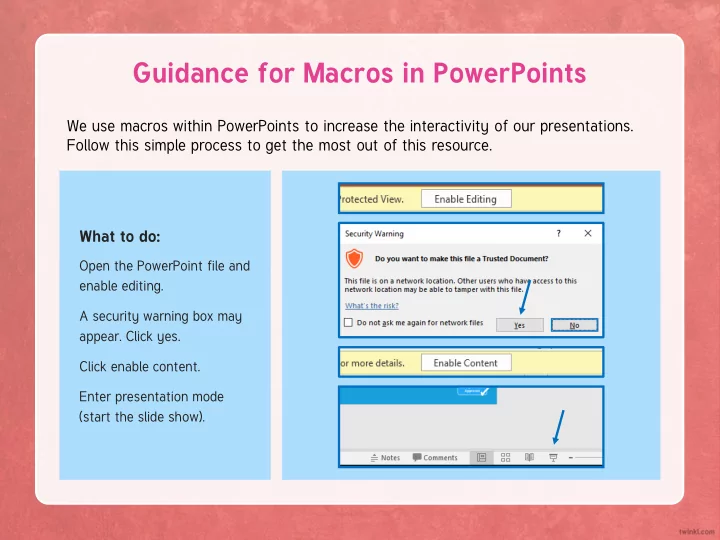

Guidance for Macros in PowerPoints We use macros within PowerPoints to increase the interactivity of our presentations. Follow this simple process to get the most out of this resource. What to do: Open the PowerPoint file and enable editing. A security warning box may appear. Click yes. Click enable content. Enter presentation mode (start the slide show).
Aim • To label the parts and functions of the circulatory system. • To understand Dr Daniel Hale Williams’ accomplishments. Success Criteria • I can label the main parts of the heart. • I can explain the basic function of the heart. • I can discuss how the attitudes of people at different times may have presented obstacles to scientists and inventors.
The Heart The heart is made of four chambers: two on the left and two on the Diagrams are drawn as if you were looking at the heart of a person We know that the heart pumps blood around the body. right. The upper chambers are called the left and right atrium and the opposite you, so the right-hand chambers are drawn on the left-hand bottom chambers are the left and right ventricles. side of the diagram and vice versa. right atrium left atrium left ventricle right ventricle
The Heart Oxygenated blood comes from the lungs into the left atrium... and exits the heart via the left ventricle to carry oxygen to the body. left atrium left ventricle
The Heart De- oxygenated blood (that has ‘dropped off’ its oxygen supply around and exits the heart via the right ventricle and straight into the lungs to the body and is now carrying carbon dioxide) enters the heart through be oxygenated again. the right atrium… right atrium right ventricle
The Heart The vessels taking blood in and out of the heart each have specific De-oxygenated blood coming from the body enters the heart from the Blood enters from the lungs from the left and right pulmonary veins . These vessels are all large veins . names too. superior and inferior vena cava . superior vena cava pulmonary vein pulmonary (left) vein (right) inferior vena cava
The Heart De-oxygenated blood being pumped to the lungs exits via the left and Oxygenated blood headed for the rest of the body exits through These vessels are all large arteries . right pulmonary arteries . the aorta . aorta pulmonary artery (left) pulmonary artery (right)
Label the Heart How did you do? With a partner, see if you can label the four chambers of the heart and the main blood vessels bringing blood into and out of the heart. Extra challenge – Can you explain the direction of blood flow? Or where each vessel leads to or from?
Dr Daniel Hale Williams People have understood how the heart works for a long time, but due to a lack of anaesthetic, antiseptic and blood transfusions, most people couldn’t expect to have their heart ‘fixed’ before the 1900s. That didn’t stop Dr Daniel Hale Williams. In 1893, he performed the world’s first successful open-heart surgery, without blood transfusions, with unreliable anaesthetic and with no way of stopping the heart from beating while he operated! But that’s not all…
Dr Daniel Hale Williams Dr Daniel Hale Williams is known for performing the world’s first successful open -heart surgery. (It was successful because the patient survived for 20 years.) Daniel Hale Williams was also the first black person admitted to the American College of Surgeons. He founded the first multiracial hospital and medical training schools for black nurses at a time when black people would have been refused medical treatment in many hospitals.
Dr Daniel Hale Williams Research the life and accomplishments of Dr Daniel Hale Williams to answer the questions on the Dr Daniel Hale Williams Activity Sheet .
Aim • To label the parts and functions of the circulatory system. • To understand Dr Daniel Hale Williams’ accomplishments. Success Criteria • I can label the main parts of the heart. • I can explain the basic function of the heart. • I can discuss how the attitudes of people at different times may have presented obstacles to scientists and inventors.
Recommend
More recommend